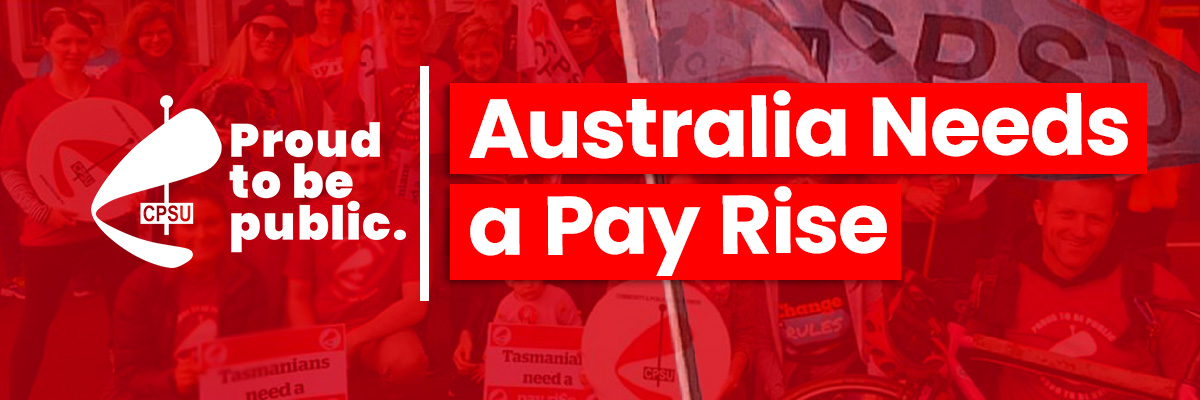
This year the Albanese Government is bringing forward legislation to fix the loopholes in Australia’s industrial relations laws. These are urgently-needed reforms that unions have been campaigning for years to secure. Our opportunity is here.
This year we’ve been keeping members up to date on the roll-out of key reforms from the Secure Jobs, Better Pay Act. But this was just the first step – there’s more work to be done. Australia Needs a Pay Rise is a new campaign pushing for the next stage of industrial relations reforms to Restore Fairness and Job Security for working people.
It’s about fixing a broken industrial relations system that lets employers undermine collective Agreements and lock in stagnant wages while their own profits continue to soar. Here’s how:
Restoring Job Security:
At a glance:
- Same Job, Same Pay
- A Fair Go for Casuals
- End Sham Contracting and Unfair Contracts
Same Job, Same Pay
The Problem:
The world of work has changed, and our laws have not kept up. Many employers have used loopholes to reduce wages and job security or simply to avoid their obligations (see our story on their response to Same Job, Same Pay laws). We need to update our laws to restore fairness and close the loopholes.
Did you know that Qantas uses 14 different companies to employ its flight attendants who are on different pay doing the same job? Big business has become highly skilled at avoiding laws that don’t suit them. Some big businesses have set up shell companies to employ staff as a means of cutting wages and subverting collective agreements.
Companies do this to get around their agreements with workers and their unions. And it’s just like tax avoidance – they’re experts at it. The result is workers getting paid less than people they are working right next to, doing the same job, and collective bargaining being undermined.
The Solution:
We need new laws which ensure if you are doing the same job as the person next to you then you get the same pay and conditions. That’s a minimum standard that passes the pub test. Short-term labour hire should be used to fill genuine temporary needs; not as a weapon to cut wages and job security.
A Fair Go for Casuals
The Problem:
The Morrison Government passed laws that allow employers to call someone a casual even if they are doing permanent work. The pandemic highlighted that 1 in 3 Australian workers don’t have sick leave. These laws are fundamentally unfair and unsafe – they need to go.
The Solution:
We need laws that define what is a casual job, ensuring the Fair Work Commission can resolve disagreements and give people working regular hours the right to convert to permanent employment. Employers shouldn’t have the right to replace secure jobs with casuals just because they feel like it.
Employee and Employee Like – Sham Contracting and Unfair Contracts
The Problem:
Workers are often told they need an ABN to take on a job, unknowingly becoming contractors when they are really genuine employees. Recently the High Court opened the floodgates to this practice by finding that a backpacker on a construction site could be an ABN worker and receive even less than the minimum wage simply because of the contract he signed, even though in practice he was working just like an employee. Many staff employed via platforms have no rights whatsoever and unfair contracts go unchecked.
The Solution:
We need a flexible system overseen by the Fair Work Commission that give workers rights that are fair to their circumstances. We need to put an end to sham contracting through new laws that ensure contractors have rights and that unfair contracts can be remedied by the Fair Work Commission. We need the law to clearly define who is an employee to remove any doubt and to stop employers from exploiting these loopholes. We need to protect workers, whatever they’re called.
Restoring Fairness:
At a glance:
- Ending discrimination at work
- Wage theft
- Repairing the safety net
- Fair agreement making
- Closing the loopholes
- The right to disconnect
Ending discrimination and harassment at work
The Problem:
Australia has some of the best anti-discrimination laws in the world. But our laws in relation to discrimination, harassment and protection at work are inconsistent and there are serious loopholes.
The Solution:
We need laws that are consistent, no matter where people are being discriminated against or harassed. We need to ensure that where there are breaches of these laws the Fair Work Commission can step in and act: an independent umpire with real teeth.
Discrimination and harassment laws must also protect union delegates who represent other workers in the workplace. Delegates are often targeted at discriminated against at work. Union delegates need time and support to play their part in making our workplaces fairer and safer.
Wage Theft
The Problem:
Ten years of Coalition Government saw wage theft reach new heights. Wage theft now amounts to around $12 billion dollars a year being stolen from working people. Recovery is costly and slow and often tied up in the courts for years. The Federal Court is not the right court to deal with wage theft. It is costly, legalistic and matters usually take years to settle. The time and cost of recovering stolen wages makes it too hard for workers to enforce their rights and too easy for employers to get away with wage theft. The penalties for engaging in wage theft have also shown not to be an effective deterrent.
The Solution:
The Government has committed to criminalising wage theft. This is commendable, and will act as a deterrent, however it will not help workers recover stolen wages. New laws must make wage recovery quick, easy and low cost. At the moment only those with deep pockets can get their money back and cases can take years.
Repairing the Safety Net
The Problem:
Under our existing laws it is extremely difficult to update Awards as employers and unions no longer have the standing to make this happen. Successive Coalition governments have neglected – and actively attempted to dismantle – Awards as a safety net for workers.
The Solution:
Responsibility for the Award System needs to return to unions and employers. Unions and employers need to be able to bring forward cases to update Awards, so they remain up to date, relevant to the industry or occupation they cover and are in line with community expectations.
Fair Agreement-making
The Problem:
Over the years governments have moved to severely limit the issues employers and workers are able to bargain over. This is highly unusual. Internationally, most countries accept it is not the business of the State to tell employers and workers what they can or cannot discuss at the bargaining table with their employers.
Did you know that it would be unlawful to include a term in an agreement:
- Related to a climate friendly workplace,
- Setting out agreed levels of staffing, or
- Setting minimum targets for apprentices.
Historic industrial actions taken by unions in the 1970s and 1980s to protect world-recognised natural and cultural heritage sites (‘Green Bans’), as well as prevent discriminatory sackings of LGBTIQA+ workers would be unlawful today.
The Solution:
Employers and employees should be able to decide what they bargain over, not the Government. The world of work is changing all the time and workers need a bargaining system that is flexible and meets the ever-changing needs of a modern workforce.
Closing the Loopholes
The Problem:
The National Employment Standards set a minimum set of rights and entitlements that apply to all workers. These have not been reviewed or updated since 2009. Subsequent interpretations by the courts, and changes to laws by successive Coalition governments have weakened these standards. Examples include:
- Many shift workers are entitled to 5 weeks annual leave – the courts have whittled this entitlement away.
- When you are on leave that covers a public holiday you are entitled to not count that day towards your leave – the courts have pared back this entitlement.
- The NES provides for 10 days of personal/carers leave – the courts have defined this entitlement as 1/26 of your ordinary hours – not 10 days. This means many employees on shift work or compressed hours only get 7 or 8 days, reducing the time they have to care for themselves or their families.
The Solution:
The NES needs to be clarified to restore rights that have been lost or hollowed out.
The Right to Disconnect
The Problem:
Technological advances are completely breaking down the boundaries between work and family time. Employer demands on workers have become overwhelming. Many employers expect workers to answer text and emails at any time of the day. We need new laws that deal with these intrusions and provide workers with the right to disconnect.
The Solution:
We need the National Employment Standards to set out the right of every worker to disconnect from work. And we need new provisions in Awards that set specific industry-based standards.
Be a Part of the Solution
Sign the Petition to call on the Albanese Government to help lose the loopholes and get wages moving: https://www.megaphone.org.au/petitions/close-the-loopholes-and-keep-wages-moving
We say that governments should set the standard by providing good, secure, fairly paid jobs. Our movement is fighting for a more equal society; we are fighting to change the rules. But we can’t do it alone.
If you’re ready to be a part of the solution, share this story with your friends, family and co-workers. And if you’re not yet a union member, join us today.








